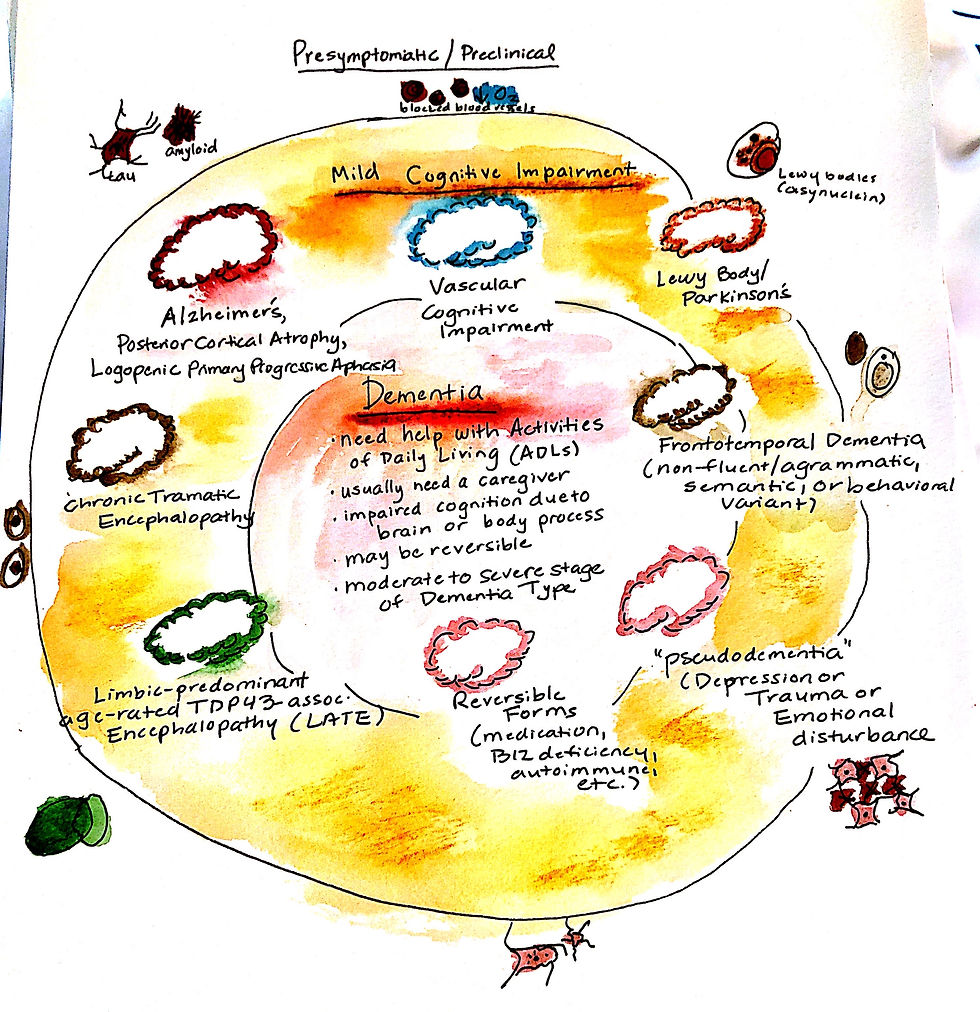What is the difference between Alzheimer’s and Dementia?
- Dr. Hilary Glazer
- Dec 19, 2019
- 2 min read
Updated: Mar 4, 2020
Many people think that Alzheimer’s and Dementia are the same. Sometimes they are, and sometimes they are not.
Let me explain. All the word Dementia means is that someone has memory or cognitive problems to the point that they need help with their activities of daily living, like working, driving, or paying bills. They are in the moderate to severe stage of their disease. The word Dementia does not specify why the person has it, or whether it is coming from problems with their whole body, or just their brain. It also doesn’t specify if it’s reversible or not. For example, someone could have Dementia because of vitamin B1 deficiency (or other types of reversible cognitive impairment in my post here) and once it is treated, the person may improve to the point that they no longer have Dementia.

People with Alzheimer’s Disease may have Dementia, and it is then called Alzheimer’s Dementia. When we say they have Alzheimer’s Dementia, they are in moderate to severe stage, and may have trouble working, driving, doing bills, or in severe, they have trouble getting up, using the bathroom or dressing on their own.
However, some people with Alzheimer’s do not have Dementia. These are people in the presymptomatic (also known as preclinical) stage who have changes in their brain pathology consistent with Alzheimer’s Disease or other types of neurodegenerative disease, but they have no symptoms of the Disease yet. Other people with Alzheimer’s don’t have dementia because they are in mild stage (what we call Mild Cognitive Impairment), and there are mild changes that don’t affect daily life, such as repeating oneself, needing reminders, or trouble with occasional words or names.
Some people with Dementia have other brain diagnoses than Alzheimer’s, such as Vascular Cognitive Impairment, Parkinson’s-related Cognitive Impairment, Lewy Body Disease, Primary Progressive Aphasia, or Frontotemporal Dementia. All of these disease come in mild, moderate, and severe stages, so it is possible for someone to have the disease without Dementia (mild stage), or to have activities of daily living impacted (moderate or severe stage), and thus qualify as Dementia.
They may also have reversible forms of dementia or cognitive impairment due to medical causes (such as B12 deficiency, or heart attack), or depression, trauma, or history of sexual abuse.
Which is a better term to use? Dementia or X Disease? I usually recommend asking the patient what they want to call it themselves, but personally I would say that to many people the word Dementia connotes that a person is crazy or of low intelligence. It usually has a negative connotation in our lay culture. I would recommend that we use the specific term for the disease (such as Alzheimer’s, or Vascular Cognitive Impairment, etc.) because it is more specific and when people hear that and see someone whom they can barely tell has anything wrong (such as in mild stage), they can still see that people with cognitive impairment can still do many things. It may encourage the public to know more about each disease, come earlier to get tested, and reduce the level of stigma associated with these diseases.





Comments